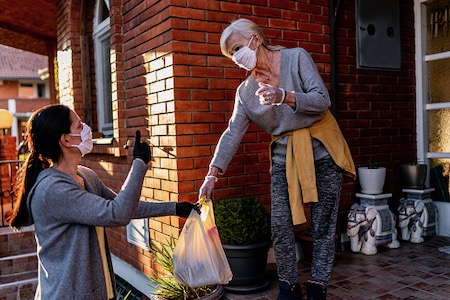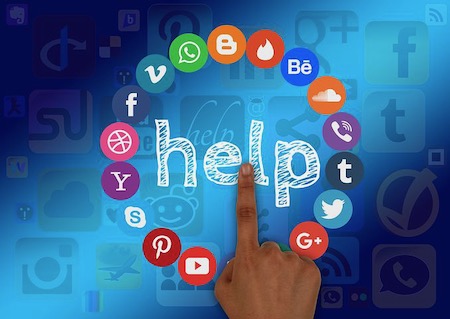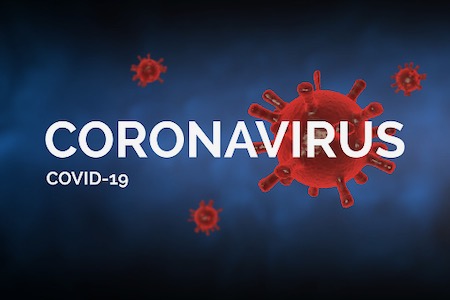The Love-goddess and I are each going to receive $300 … tax-free! This is going to be life changing!! OK, that’s not true. In reality, we need this combined $600 as much as we need a poke in the eye with a sharp stick.
When the Canadian government announced in May that everyone currently receiving the Old Age Security payment (OAS) would receive a $300 supplement a lot of thoughts and questions popped into my head. Everyone is going to get this, but should everyone be receiving it, or should it be means-tested so only those who really need it would be eligible? Should any of us be receiving it? Is it too much or is it too little? Etc.
I will briefly examine some of these questions later in my musings, but that is not really the intent of this article. Before my mind started churning out these questions, my first thought was we don’t need this money, and I’m pretty sure most of our friends don’t need it either. The immediate question became, what will we do with it, and I wonder what our friends will do with it?
So, what to do with the money? But first, a little background information about the program.
The Program
The following quotes are from various media outlets. Rather than trying to summarize everything myself, realizing that I would just be repeating what these folks have already said, I decided to put the original material here for your perusal to remind you about the basic features of the program.
From the cbc.ca website:
“Seniors will be receiving a one-time payment of up to $500 to help offset any increases in the cost of living due to COVID-19 …”
“Seniors Minister Deb Schulte said today that seniors who qualify for Old Age Security (OAS) will be eligible for a one-time, tax-free payment of $300, and those eligible for the Guaranteed Income Supplement (GIS) will get an extra $200.
Those eligible for both will receive $500.”
Also, from the cbc.ca article, the rationale for implementing the program.
“Schulte said seniors are facing extra dispensing fees for prescriptions, added costs for grocery delivery services and taxi fees when they might normally take the bus.
“It’s all small amounts, but it adds up,” she said.”
From the Motley Fool website the big numbers involved:
“About 6.7 million will receive the OAS top-up, while an estimated 2.2 million seniors will receive the OAS boost plus the $200 GIS payment. The federal government will spend $2.5 billion for the exclusive non-taxable amount. Whether the payment is direct deposit or through cheque, you’ll receive the full payment ($300 or $500).”
If you are interested in what the Canadian government has to say about this program you can check it out at their website by following this link:
https://www.canada.ca/en/services/benefits/publicpensions/notice-covid-19/one-time-payment.html
 What We Are Doing
What We Are Doing
Our plan is to take our combined $600, add another $400 to it, and donate $1000 to our local hospital. This is our way of saying, thank you for the great care you provided during my four-month long hospital stay, and for the heroic effort that the healthcare workers in the intensive care unit put into saving my life.
What Others Are Doing
In an effort to find out what our friends were thinking about the Government freebie, I posted a request on Facebook and sent out an email blast inquiring about what they were planning. The following was my “ask”.
“I need your help … you may insert your own joke about what sort of help I need here. 🙂 I have started to write an article for my website concerning the $300 everyone who currently receives OAS will be receiving in the next few weeks.
In the article, amongst other issues, I would like to talk about the various things people are planning on doing with the money; giving it to kids who are now jobless, donating it to a charity, contributing to a grandchild’s RESP, or using the money because individuals feel they have incurred extra expenses as the program claims has happened. If you, or someone you know, has some thoughts on this I would appreciate it if you would flip me a note in Messenger and let me know what you/they are planning on doing with it. I will not be naming names in my piece of course.”
A number of folks responded to my request. Many of them in great detail, which was very thoughtful and helpful. Here is what they had to say.
Charitable Donations:
Like us, many of our friends said they were going to be making charitable donations with the extra money. Some of these were to charities and agencies to whom they were already donating, but many were related to the situation created by the pandemic.
People were donating to – local foodbank(s), their church/parish, homeless shelters, Humane Society/SPCA, local social service agencies, their local hospital, The Canadian Wildlife Federation, a home for trafficked women and their babies, etc. Some folks had already made “pandemic donations” before the $300 freebie was announced.
Help Family Members:
The second most frequent response was helping out family members. Many folks have had their children, or other family members lose their job or have their salaries reduced as a result of the pandemic. Many individuals felt the need to financially support these family members through this difficult period.
A couple other responders indicated that they were going to give the money to their children/grandchildren who are going to be starting University in the fall. Another individual said that her adult children and their partners had both been working from home and that their four children were starting to show the effects of having spent too much time in lockdown. She said she was going to send half the money to them so that they could arrange for some special outings for her grandchildren.
Directly Help the Needy:
Some folks stated that they wanted to get the money directly into the hands of people they didn’t know, but were in need. One couple was going to give the money to a family of Syrian refugees who they had helped out on previous occasions. Another couple said that they were searching out “local front-line social service agencies that help marginalized populations that are particularly hard-hit by the pandemic.”
Interestingly, another couple who live in a smaller Ontario community, said that they had asked a local minister if he could arrange for their funds to be directed to a local needy family. They wrote that he claimed that “he did know of some families like that and he would ask around and get back to us.” but that “We never heard from him again”. Unfortunate.
 Help Internationally:
Help Internationally:
Two sets of friends, who both winter in Mexico, wrote to say that they were going to be donating the funds they received to folks in need in Mexico. C. and J. intended to give money to two different families they know who would benefit from a donation. “They do not have a CERB to help them and both families have two children … to say that the adults‘ jobs are precarious is an understatement They rely on tourism for their income.”
G. wrote that he and his wife were planning on donating their funds to groups in one of the areas that they visit “to purchase medical supplies and to help with their food bank.”.
He also went on to say:
“I would recommend that if people want to put their $300 to use that they consider countries where they have travelled to, or vacationed in, that are third world or developing world countries for a number of reasons:
1. The money goes a lot further there and so can support more people for a longer time.
2. As in Mexico, in most cases there is very little or no government support.
3. The tourism industry is gutted and likely will be for a long time meaning that many are without work.
4. Health care is usually underfunded or not up to world standards.
Of course, a cautionary note: you have to do some research to make sure that the money you donate gets to where you want it to go. We were fortunate in having contacts that we could trust.”
Definitely food for thought.
The Oddest Response I Received:
A family member responded that “The condo heads have decided that we residents will have to pay extra to pay for supplies because of the virus. The payment will be $296. That pretty well uses that money.” This person lives in a condo building that is filled with seniors. How ODD that the condo board would come up with an amount so close to what they knew everyone would be receiving.
Some International Feedback:
Interestingly, a couple of my friends who live in Hong Kong and in Australia respectively felt compelled to let me know what they were doing to support others during the pandemic. Good for them.
B. in Hong Kong reported that –
“The HK government is giving every permanent resident HK$10,000, or about $2000 each. We really do not need it. Mine is going to help pay my daughter’s tuition at Sydney UNI in Australia.”
F. and K. in Australia wrote –
“We feel to be in such a fortunate position and have increased our donations. … so through a friend who works in India, supporting some people there who have lost their incomes, a family from here who have had to relocate to look after a sick baby, and after some research we are now doing a monthly donation to a charity in Afghanistan and one in Vietnam…we have also done some one off ones to some travel groups etc…
We will keep sharing our resources and our time as best we can.”
 Giving Thought to the Questions
Giving Thought to the Questions
As I said previously, this article is not meant to be an in-depth examination of the merits of government’s pandemic program for seniors. That said, it would probably be a good idea to provide a quick consideration of some of the questions raised.As I said previously, this article is not meant to be an in-depth examination of the merits of government’s pandemic program for seniors. That said, it would probably be a good idea to provide a quick consideration of some of the questions raised.
First up. Should everyone be getting it? I suppose an argument can be made on both sides of the question. The government is already increasing the deficit by an enormous amount with its various pandemic programs, so if the $300 program was means-tested a significant amount of money could be saved. Conversely, perhaps any money saved by having a means-testing program would be loss in the cost of trying to determine who should get the money and who should not. Or, that the means-testing process could drag out getting money into peoples’ hands for so long that it totally negates the value of trying to help.
Secondly, do we really need the money? Those who say yes could probably reason that the government is right and that most seniors are incurring increased costs to pay for things like those the government has identified, “extra dispensing fees for prescriptions, added costs for grocery delivery services and taxi fees when they might normally take the bus,”. On the other hand, from our own experience I know that we are saving a pant-load of money every month because we are not going out and doing all the costly things that we would do before the lockdown began. So, there are probably lots of people who don’t need the money.
Thirdly, is it the right amount of money? If you are a senior for whom the monthly OAS stipend is a major part of your income you may well argue that $300 is an insufficient amount. Seniors living alone may be thinking, what I really need is Internet access to facilitate contact with family members or to see what is going on in the outside world. Or, I need it to provide the ability to subscribe to content-rich services like Netflix to keep myself from going “squirrely” during the lockdown. Others may argue that it is simply a waste of time to receive a small amount of money like $300. The money is either not needed, or it is too small an amount to pay for anything useful. Or, they will think that all I am going to do with this money is to send it off to someone or some agency who will have better use of it.
My own thoughts on these questions are as follows. I feel that the government did the right thing in setting up a simple to manage system that put $300 in everyone’s hands as quickly as possible. Those who need the money will find it useful. Those of us who don’t need the money will pass it along to where it can be used more effectively.
One of my friends went on in her reply to identify some questions that the program evoked in her. S. in Mississauga asked:
“If I donate the money to charity and receive a charitable tax receipt, should I be donating that additional amount, so as not to indirectly benefit from any of the $300?
Taxes will have to increase (to pay for the newly created pandemic related deficit I assume). Could this $300 be applied to those increased future taxes?
For those with strong political leanings. Could the $300 become a political party donation?”
How It All Shakes Down
You will have noticed that I have not mentioned the additional $200 that folks who are receiving the Guaranteed Income Supplement GIS will receive in my musings. I’m pretty sure if you are receiving the GIS you will be very happy to receive the $300 and the $200 GIS supplement. AND, that it will be very helpful in paying for your day-to-day living expenses.
Rightly or wrongly, during the week of July 7th, those of us who are currently collecting the Old Age Security benefit will receive our $300. It will be interesting to see if any media outlets follow up reporting provides some insight into what people are doing with the money. I rarely ask folks to comment on my blog posts, but for this one I would love to hear what you intend, or end up doing, with your $300.
Finally, many thanks to our friends and family members who responded to my request. You are all wonderful, thoughtful, charitable people.




You are a thoughtful, logical and clear writer. I always enjoy what you write. Thanks for this one….and thanks too for the sense that there are generous people, individually and in couples who are not moving to poor me syndrome, but to the what can I do to make this better question.
Thank you for being one of the people who tries to make things better. I love Carol, you know that, but I am equally glad to count you among my friends.